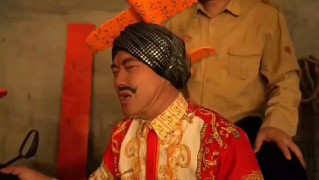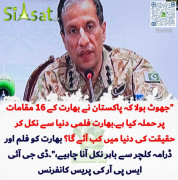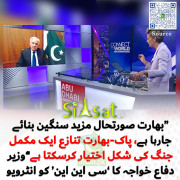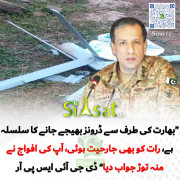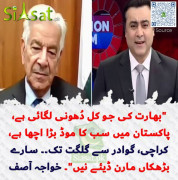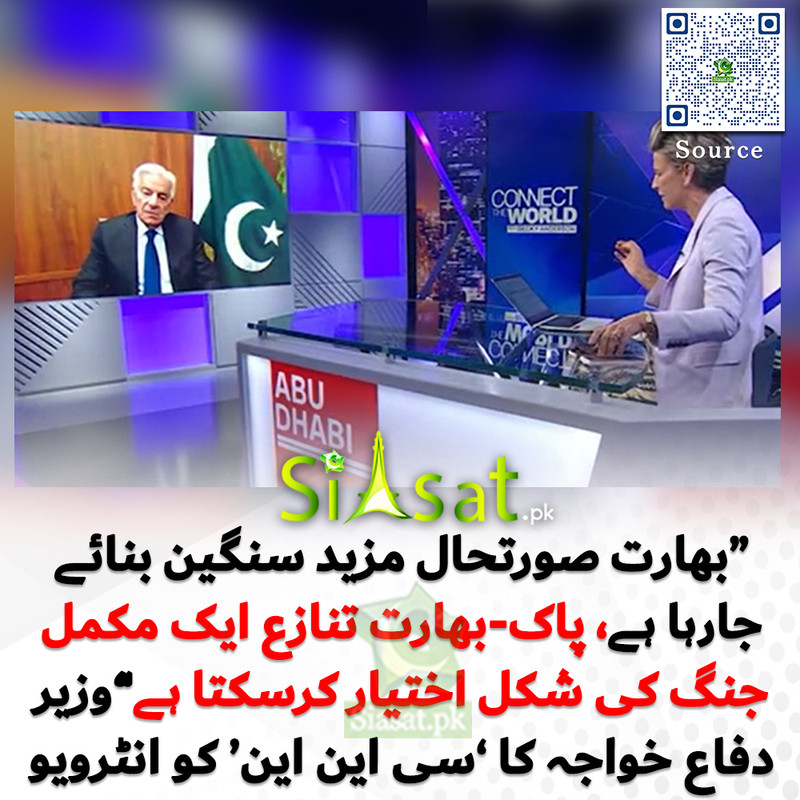Pakistani opposition politician Imran Khan speaks to his supporters during an anti-government protest in front of the parliament building in Islamabad, Pakistan. Photograph: Xinhua/Barcroft Media
Hamid Mir, one of the few remaining famous faces on what was until recently Pakistan's most watched television station, runs a nightly gauntlet to get to his Islamabad studio. For weeks the street outside has been full of rowdy supporters of Imran Khan, an opposition politician, who is leading street protests a few hundred metres away aimed at forcing out the government.
Khan's supporters not only loathe the rule of the prime minister, Nawaz Sharif, they also hate Geo, the news channel that Khan decries from the roof of a converted sea container, from where he makes daily addresses to thousands of supporters.
"They regard Geo as the enemy," says Mir. "[Khan] is talking against my channel every night and his workers attack our journalists every day."
Some politicians have declined invitations to appear on his eveningCapital Talk programme, saying they are unsure they can safely get behind the razor-wire topped wall recently erected around the building. The mood has been tense ever since Khan and Muslim cleric Tahir ul-Qadri launched parallel sit-ins on the streets of the capital this month .
The deep animosity of Khan towards the Geo-Jang media conglomerate that employs Mir is one element of a political crisis that has bitterly divided the media and the political class. Many analysts also believe it has helped the military in its long-running battle for supremacy over the civilian government.
Mir, a veteran journalist often close to the centre of events, played an inadvertent role in triggering the current crisis when he was critically injured by gunmen who opened fire on his car as he was travelling through Karachi in April. Even as he was unconscious in hospital his colleagues at Geo wasted no time in broadcasting explosive allegations that the attempted killing had been ordered on the direct orders of Zaheer ul-Islam, the head of the country's powerful military intelligence agency, the Inter-Services Intelligence directorate (ISI).
The accusation sparked fury from the army, who strongly rejected the unsubstantiated allegations and demanded that the enormously popular station be shut down. But Nawaz Sharif, a prime minister determined to bring to heel a military that ousted him in a 1999 coup, very publicly backed Geo.
The standoff further soured relations with a military top brass already angry at Sharif for the high treason trial he ordered for the former dictator Pervez Musharraf and for the prime minister's dogged resistance to army demands for military operations against the Pakistani Taliban.
It also nearly destroyed Geo. Not only have some of the channel's star names defected to rival broadcasters eager to eat into Geo's once commanding audience share, the company is said to be rapidly losing money, after cable providers and advertisers were pressured into dropping the channel. The network is now struggling along largely on money earned internationally from Pakistani viewers around the world.
Commercial pressure has recently been reapplied following Geo's critical coverage of the Islamabad protests that failed to attract anything close to the 1 million people Khan had promised.
"The people who are controlling Imran and Qadri say we are contributing to the failure of the protests because Geo is saying again and again that they failed to mobilise a million people," says Mir. "So again they are forcing cable operators to take us off the air."
For his part, Khan has blamed Geo for being complicit in what he claims was the industrial rigging of last year's general elections – a claim that has not been supported by independent election observers. Although Khan's long sit-in outside parliament is ostensibly to protest against electoral fraud, most commentators believe he would not have launched his "long march" if Sharif had not been severely weakened by his bruising battles with the army.
Some fear Khan and Qadri may even have unwittingly helped cement a "soft coup" by the army, which will leave Sharif in power but subordinate to the military.
Mir believes the army had long been looking to nobble the country's lively private broadcasters, many of whom have become craven supporters of Khan and the military. "They know they have to divide us," he says. "They learned their lesson in 2007 that when we are all united there is no room for their conspiracies."
Seven years ago, a united front by news organisations and lawyers ultimately sealed the end of Musharraf's long military rule. But despite his near assassination, which left two bullets inside him, and the beleaguered state of the company he works for, Mir continues to chide the army – he rounded off a recent show with a note to his viewers that "interference of army in politics is treason".
And even though Geo, after weeks of being branded as an "anti-state" channel did eventually apologise to the army, Mir still insists that he was nearly killed by "some elements of the ISI … including the head of the ISI. I am not part of my organisation's apology because I am a victim and I need justice."
http://www.theguardian.com/world/2014/aug/29/pakistan-opposition-fights-geo-tv-station
Hamid Mir, one of the few remaining famous faces on what was until recently Pakistan's most watched television station, runs a nightly gauntlet to get to his Islamabad studio. For weeks the street outside has been full of rowdy supporters of Imran Khan, an opposition politician, who is leading street protests a few hundred metres away aimed at forcing out the government.
Khan's supporters not only loathe the rule of the prime minister, Nawaz Sharif, they also hate Geo, the news channel that Khan decries from the roof of a converted sea container, from where he makes daily addresses to thousands of supporters.
"They regard Geo as the enemy," says Mir. "[Khan] is talking against my channel every night and his workers attack our journalists every day."
Some politicians have declined invitations to appear on his eveningCapital Talk programme, saying they are unsure they can safely get behind the razor-wire topped wall recently erected around the building. The mood has been tense ever since Khan and Muslim cleric Tahir ul-Qadri launched parallel sit-ins on the streets of the capital this month .
The deep animosity of Khan towards the Geo-Jang media conglomerate that employs Mir is one element of a political crisis that has bitterly divided the media and the political class. Many analysts also believe it has helped the military in its long-running battle for supremacy over the civilian government.
Mir, a veteran journalist often close to the centre of events, played an inadvertent role in triggering the current crisis when he was critically injured by gunmen who opened fire on his car as he was travelling through Karachi in April. Even as he was unconscious in hospital his colleagues at Geo wasted no time in broadcasting explosive allegations that the attempted killing had been ordered on the direct orders of Zaheer ul-Islam, the head of the country's powerful military intelligence agency, the Inter-Services Intelligence directorate (ISI).
The accusation sparked fury from the army, who strongly rejected the unsubstantiated allegations and demanded that the enormously popular station be shut down. But Nawaz Sharif, a prime minister determined to bring to heel a military that ousted him in a 1999 coup, very publicly backed Geo.
The standoff further soured relations with a military top brass already angry at Sharif for the high treason trial he ordered for the former dictator Pervez Musharraf and for the prime minister's dogged resistance to army demands for military operations against the Pakistani Taliban.
It also nearly destroyed Geo. Not only have some of the channel's star names defected to rival broadcasters eager to eat into Geo's once commanding audience share, the company is said to be rapidly losing money, after cable providers and advertisers were pressured into dropping the channel. The network is now struggling along largely on money earned internationally from Pakistani viewers around the world.
Commercial pressure has recently been reapplied following Geo's critical coverage of the Islamabad protests that failed to attract anything close to the 1 million people Khan had promised.
"The people who are controlling Imran and Qadri say we are contributing to the failure of the protests because Geo is saying again and again that they failed to mobilise a million people," says Mir. "So again they are forcing cable operators to take us off the air."
For his part, Khan has blamed Geo for being complicit in what he claims was the industrial rigging of last year's general elections – a claim that has not been supported by independent election observers. Although Khan's long sit-in outside parliament is ostensibly to protest against electoral fraud, most commentators believe he would not have launched his "long march" if Sharif had not been severely weakened by his bruising battles with the army.
Some fear Khan and Qadri may even have unwittingly helped cement a "soft coup" by the army, which will leave Sharif in power but subordinate to the military.
Mir believes the army had long been looking to nobble the country's lively private broadcasters, many of whom have become craven supporters of Khan and the military. "They know they have to divide us," he says. "They learned their lesson in 2007 that when we are all united there is no room for their conspiracies."
Seven years ago, a united front by news organisations and lawyers ultimately sealed the end of Musharraf's long military rule. But despite his near assassination, which left two bullets inside him, and the beleaguered state of the company he works for, Mir continues to chide the army – he rounded off a recent show with a note to his viewers that "interference of army in politics is treason".
And even though Geo, after weeks of being branded as an "anti-state" channel did eventually apologise to the army, Mir still insists that he was nearly killed by "some elements of the ISI … including the head of the ISI. I am not part of my organisation's apology because I am a victim and I need justice."
http://www.theguardian.com/world/2014/aug/29/pakistan-opposition-fights-geo-tv-station
Last edited by a moderator:



